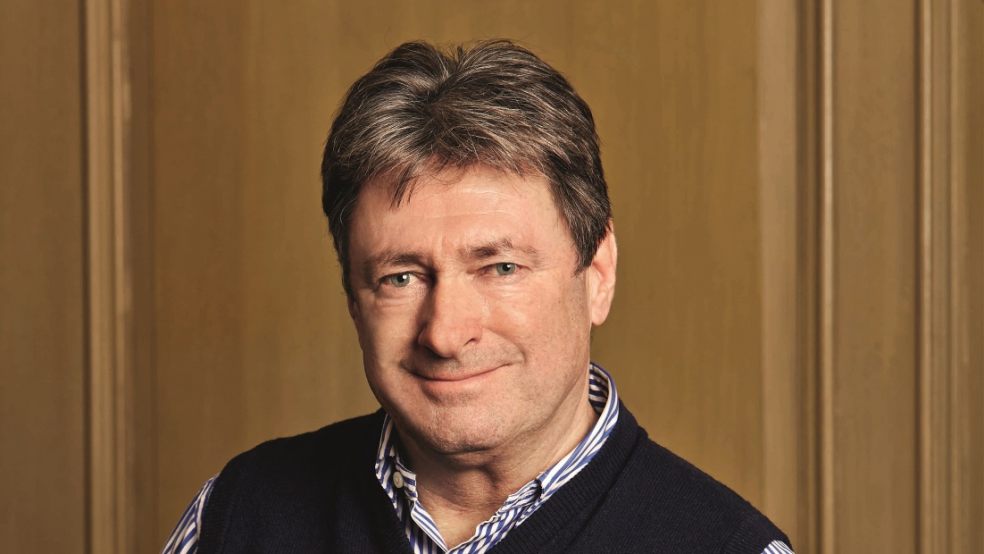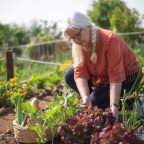
Alan Titchmarsh at 70: 'I'm trying to balance my life'
He may be 70, but gardening expert, broadcaster and novelist Alan Titchmarsh shows no signs of slowing down.
He’s recently been seen transforming forlorn plots into beautiful gardens in ITV’s Love Your Garden, is an ambassador for The Prince’s Trust and has just brought out his first book of poetry, Marigolds, Myrtle And Moles.
He and his wife Alison live in Hampshire and have a holiday cottage on the Isle of Wight. They have two grown-up daughters and four grandchildren.
Here, he reveals how he keeps himself fit, why he keeps working and what keeps him young.
How did you feel about turning 70?
“You are what you are. Although it’s a landmark when it’s got a nought on the end, the only thing worthy is to keep going.”
Has climate change changed your habits?
“Yes. Way back, we used to spray everything and I’ve been organic for 40 years. It’s a responsibility to what’s out there. Whatever I’m doing in the garden, I want to be aware that it is having a beneficial effect on the planet.”
In your new book of poetry, Marigolds, Myrtle And Moles, you lament your aches and pains…
“Yes, I get a bit of backache from 60 years of gardening, but I’m very lucky. My knees have both been sorted out, not replaced, just strimmed out.
“I had a couple of arthroscopies, where they put this little thing in – like a strimmer – and it cuts off the frayed bits. I had the last one about three years ago. I can kneel, I’m fighting fit now.”
What’s your best way to chill out after a long day?
“I just wander around my garden.”
Is gardening the only exercise you do?
“I walk a lot. When I’m working in London, I walk everywhere. I did the gym for a bit and it’s so boring. I just get brain-dead.
“I don’t overeat, but like everybody, when you get a bit sedentary in winter, you start to get a bit more comfortably padded and I get a bit irritated with myself. I think, ‘Come on, we can get rid of this’ and I eat more sensibly. The more steadily you take it off, the longer it stays off in my experience.”
Have you taken more care of yourself as the years have gone on?
“I don’t think so. I just do what I want to do. I don’t smoke, I like to think that I drink in moderation but oh, goodness me, I do like a glass in the evening.
“I was reading in the papers that the dangerous age for drinking was between 40 and 60 and I keep thinking, ‘Yippee! I’ve come out the other side!’
“Having had my three score years and 10, there’s the aspect where you think, ‘I’ve had my ration’. Everything now is a bonus, and I’m very lucky.”
Do you meditate?
“No, I garden, and you can think while you’re gardening. Repetitive tasks like mowing are great for letting your mind go, and if I’m writing a novel and I get stuck, I go out and mow or potter. I may not be consciously thinking about the blockage, but something will seep in, and then you can carry on.”
Do you get enough ‘me’ time?
“I will never get it right, but I very rarely work at weekends, except for charities that are close to my heart.
“I’m trying to balance my life and pace myself, but the problem is that when you love what you do, work is more fun than fun.”
How much time do you spend in your own garden?
“I’m in my garden every day when I’m not away, but it varies tremendously. I write in the morning and go out in the afternoon.”
What projects are you working on now?
“Love Your Garden has been commissioned for another two years. There’s another new project starting soon, and another novel to write next winter.”
Does working keep you young?
“I’m sure of it. I think keeping your mind active, keeping stimulated by people’s company all keeps you young. I like people and their conversation. Being interested and happy to get up in the morning keeps me going.
“I don’t like lying in bed. When I’m awake, I’m up and out. I’ve been very lucky. I live in spot which is beautiful and which I hope I’ve made more beautiful. Beautifying the earth on whatever scale is the most glorious privilege.”
Do you worry about ageing?
“I consciously try not to worry about getting older. It’s there, with everybody. We see friends and relatives who develop dementia and people who become less mobile.
“Because we are all living longer, we see people who are less physically able and you think, ‘What’s going to happen to me?’ But there’s no point in dwelling on that. What will happen will happen. At least I’ve got up this morning, I’m all right. Carpe diem!”
Marigolds, Myrtle And Moles by Alan Titchmarsh is published by Hodder & Stoughton, priced £12.99.
Image: PA
Se also: Alan Titchmarsh: Keep getting out there and get mucky













